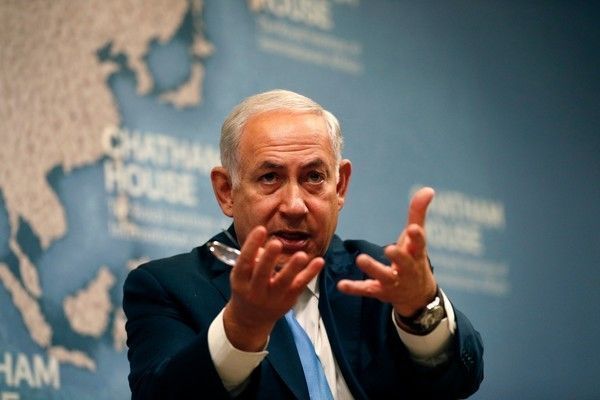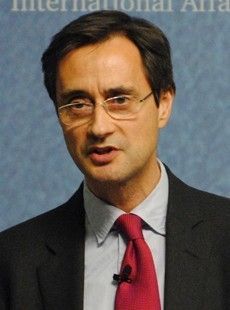London, November 3, 2017 In a wide-ranging conversation with Dr. Robin Niblett CMG, Director of Chatham House, Israeli Prime Minister Benjamin Netanyahu presented his views on the politics and history of the Middle East and, in particular, Israel’s foreign policy priorities. Questions by Dr. Robin Niblett are in italics.
Did 2011 promise a moment of great change in the Middle East or are we ‘back to the future’? Where in fact are we now in the Middle East?

Netanyahu responded by saying that the dangers facing the Middle East today are different, but that the region was as dangerous as ever before. He cited a book entitled ‘Security First,’ published by an Israeli scholar in 2013 who, he said, had no links with his political party Likud, in which the author said “democratization (especially in places where democratic infrastructures are not in place) does not lead to increased security and can in fact lead to extreme insecurity.” That was his view of what had taken place in 2011, and why “the Google boys in Tahrir Square had not succeeded.”
Netanyahu said that in the Middle East, with the cultural forces that prevailed (such as tribal loyalties), you couldn’t superimpose a Western structure. He described the struggle today as “the medievalists vs. the modernists.” The medievalists were themselves involved in a serious battle between extreme Shiites supported by Iran and extreme Sunnis led by the likes of Al Qaeda and ISIL.
As for the modernists, he suggested adamantly that they were not “Luxembourg democrats.” In such a scenario, a choice needed to be made between rampant or dictatorial threats based on radical Islam, or what some kind of authoritarian regime.
In his view, the choice was quite clear. However, the bad news was that at present, Iran and its proxies were winning. The good news was that others ( such as moderate Sunnis) were getting together with Israel as was never imaginable before to fend off the Iranian threat. He said that the collapse of Sykes-Picot had been followed by a new battle between Islam and the modernists’ as well as one between ‘Iran and Sunni moderates plus Israel.’
Is Iran’s success due to the fact it plays ‘Realpolitik’ in the region?
Netanyahu responded by making reference to a remark by Henry Kissinger, who had described Iran “as a cause and not as a country.” He said it was essential not to be misled by impressions given by individuals like Zarif, considering that the Islamic Republic of Iran (IRI) was a cult that believed in world domination. He said the Islamic Republic’s quest or cause was domination of an Islamic world that was not just limited to Shias. According to him, the IRI was both “irrational and dangerous.”
Is there connectivity between this perceived danger on the part of Iran and its previous quest for nuclear weapons?
Answering this question, Netanyahu said that the unique danger posed by the IRI was the connectivity that could have come about as a consequence of the marriage between dangerous ideologies and nuclear weapons. He said Iranian behavior ‘outside prescribed rules’ made its quest for nuclear weapons truly untenable. He said a nuclear-armed Iran was different to, say, a Costa Rica having nuclear weapons.
Is the JCPOA not the best way of stopping Iran from having access to nuclear weapons in the next 12-15 years?
Netanyahu said that the main problem was not buying a few more years, because it should not be forgotten that the IRI simultaneously would buy a few more years as well. He said that his assumptions were based on empirical facts, given that being a signatory to the Non-Proliferation Treaty (NPT) really meant nothing: countries like Iraq, Syria and Libya, whichhad actively sought to acquire nuclear weapons had all been signatories to the NPT. That is why he held the view that “the JCPOA needed to be fixed.”
Netanyahu then described in simple terms the aspects of a nuclear threat: the ‘gun to fire’ as missiles; the bullet as ‘weapons,’ and finally, the gunpowder as ‘enriched uranium,’ the production of which was hard. He said that the IRI did not succeed in putting these components together because of pressures applied from Israel, which prevented it from having the kind of industrial capacity that it needed in order to produce weapons grade enriched uranium.
The danger with the JCPOA, he said, was that after a number of years, the IRI, simply by abiding by the JCPOA’s stipulated terms, could be in a position of violating them once the allotted time frame had expired.
How then do you fix this?
Netanyahu said you could do the following:
- ‘Take the gun away’ by imposing massive sanctions to stop production of ballistic missiles.
- Inspections – including military sites – could be tightened.
- The ‘Sun-Set’ clause could be altered.
He said the risk in such an event was that Iran could go for the production of a single bomb. He said it was important to note that “a change in calendar should not be a substitute for a change in IRI behaviour.”
Changing the terms of the JCPOA would require others to come in, including Russia. What makes you think that they may forego certain tactical advantages to comply with the kind of demands you are making (irrespective of how you have been courting them recently)?
Netanyahu said the fact that Russia shared economic interests with Iran did not mean that it wanted the IRI to have nuclear weapons or to forge a Shiite empire. He said that the IRI had its own tensions with Russia. He was of the view that unless we moved now, a situation worse than North Korea might come about.
Turning to the 100-year-old Balfour Declaration and its provisions, do you believe that Israel has a responsibility in meeting such stated provisions of that declaration as the rights which the Palestinians must have and enjoy etc.?
Netanyahu said it was both their responsibility and their desire to have such an outcome, given that they all lived in that area. He said there was no question that war was bad, but “you needed two to tango, and in the Middle East, sometimes you needed three or four”.
However, he said nothing major was happening because of IRI interference – something that, according to him. was now “whispered in all regional capitals where their leaders were telling Israel, ‘you say that.’” He said that in the Persian Gulf (he followed it by Arab Gulf), it was his feeling that attitudes towards Israel had mellowed because Israel was being perceived as their ally in the fight against the IRI.

You now have 4.5 million Palestinian refugees and 1.9 million Arabs living in Israel. None have the kind of rights enjoyed by Israeli citizens (e.g. economic/social rights). The status quo seems unsustainable and even more dangerous than the IRI.
Netanyahu said the only place in the Middle East where Arabs enjoyed civic and unfettered religious rights was in Israel. He said his government had allocated a sizeable budget (1 billion shekels, an amount raised to 15 billion shekels) for Palestinian affairs. He said he wanted to see Israeli Arabs entering Israeli life in areas such as academia, etc., which needed investment. The overall problem was a continued Palestinian rejection of Balfour. If they were to accept the existence of a Jewish State in any boundary, the problem could be solved.
But even in those circumstances, could the Palestinians get a state in which they would have control over their borders, air space, etc. without some kind of Israeli oversight?
Netanyahu said maybe it was time to decide if we wanted to re-evaluate the notion of unfettered sovereignty and consider its inevitable applicability. He said that this very concept was recently challenged in the UK. On that same note, Netanyahu asked whether it could also be said that Greece did not have complete economic sovereignty (he replied jokingly by saying that he would not answer the question).
Netanyahu said Israel could not leave a place and simply allow it to be overtaken by militant Islamic forces. He said Israel had left Gaza and South Lebanon only for radical forces to raise the ‘black flag’ and hurl thousands of missiles against its people. Hence the Palestinians were entitled to and needed all the powers to represent and govern themselves, but not the power to threaten Israel. He noted that geographical factors were critically important in this discussion and this was something he had expressed to President Trump on his visit to Israel earlier in the year. He said the distance from the West Bank to the Mediterranean shore was equivalent to the distance from the Trump Towers to the George Washington Bridge in New York City.
In the Q&A session that followed, Benjamin Netanyahu highlighted the following points:
1. On relations with the US, he said that it was a powerful relationship based on commonality of interests and values. Its strength was in such shared fields as intelligence and technology. He said public support for Israel among the American people, according to an annual Gallop poll, has consistently been on an upward curve since the 1967 War, and was now at 71%, while support for Palestinians had remained steady at 18%.
2. He noted that apart from signing a ‘Memorandum of Understanding’ with the US for military assistance to Israel in the course of the next 10 years, his relations with Barack Obama and commonality of views regarding Iran had been less than satisfactory. He said that while Obama had seen Iran as part of the solution to the current state of turmoil in the Middle East, President Trump saw Iran clearly as the actual problem. He said that this was a most important shift.
3. He said Israel had not intervened in Syria but had set up a hospital near its border, which had tended to thousands of Syrian victims. However, Israel would not stand by and allow Syrian territory to be used for carrying large weapons to Hezbollah. He said Hezbollah was Iran, and if you removed the Iranian scaffolding, it would collapse. He said they had recently foiled a joint IRI-Hezbollah attempt to set up a camp near the Israeli border in Syria. But what Israel was now talking about was quite different, given that as ISIL was moving out, the IRI was moving in. He said it was the intention of IRI to colonize Syria both economically and militarily.
4. According to him, IRI wanted to set up an air base (moving fighters to the borders of Israel), create Shia divisions and deploy submarines at a new naval base. He said Israel would never let this happen, and that his government never made such statements lightly. He ended by saying that we mean what we say and we back it with action.
5. On the subject of the peace process and Oslo, he said that ‘land for peace’ was good but ‘land for rockets and terror’ was bad, noting that the key dividing issue was the Palestinian refusal to recognize a ‘Jewish State.’
6. On the recent pact between Hamas and Fatah, he said he was hopeful that it would move in the right direction in conjunction with the Trump administration’s new initiative. He said that to think out of the box, you first had to fully know the box. However, he was hopeful, mainly because of what he saw as the larger shift in Arab-Israeli relations.
7. He ended by saying that he hoped his legacy would be to be remembered as the ‘protector of Israel’ on whose watch his country’s military and economic power, international alliances and spiritual and cultural power had become greatly enhanced.

